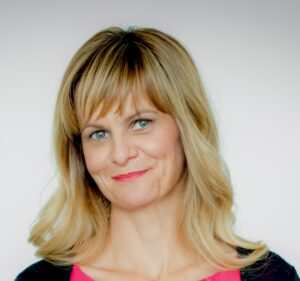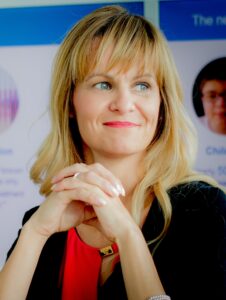We are committed to discovering and developing innovative medicines that can make a real difference in patients‘ lives.
Takeda is building one of the most exciting and diverse pipelines in the industry with approximately 40 new molecular entities, 50% of which are with orphan drug designation. Our R&D investment was $4.8 Bn in fiscal year 22, for Diplomay&Commerce says Mrs. Viktorija Zadro Huml General Manager for Croatia, Slovenia, Bosnia & Herzegovina at Takeda.

1. Takeda is an innovative, patient-focused global pharmaceutical company built on a distinguished history spanning 242 years. When we say innovation in medicine, what does that mean to you? What do you mean?
To me, innovation in medicine means developing new treatments and therapies that can improve patients‘ lives and address unmet medical needs. At Takeda, we are committed to discovering and developing innovative medicines that can make a real difference in patients‘ lives. This requires a deep understanding of the underlying biology of diseases, as well as a willingness to take risks and pursue new approaches to drug development. Innovation in medicine is not just about developing new drugs, but also about finding new ways to deliver those drugs to patients. For example, we are exploring new technologies such as cell therapy, which have the potential to revolutionize the way we treat diseases. We are also working on digital health solutions that can help timely diagnosis and treatment and help patients manage their conditions more effectively to improve their quality of life.
2. Takeda continues its transformation into an agile and innovative global pharmaceutical leader, serving the needs of patients and physicians worldwide. How many companies invest in innovation and in what way?
All pharma companies invest in innovation, but the approach can vary widely. At Takeda, we have made a deliberate effort to transform our company into a more agile and innovative organization. This has involved investing in new technologies and approaches to drug development, as well as fostering a culture of innovation throughout the company. Takeda is building one of the most exciting and diverse pipelines in the industry with approximately 40 new molecular entities, 50% of which are with orphan drug designation. Our R&D investment was $4.8 Bn in fiscal year 22. In addition to late-stage programs with potential to launch multiple treatments in the nearterm, critical programs in earlier stages of development provide sustainable long-term opportunities to advance scientific innovation.
3. Focus research and development efforts on four therapeutic areas. What are these areas and what exactly do these innovations bring?
At Takeda, we focus our research and development efforts on four therapeutic areas: oncology, gastroenterology, neuroscience, and rare diseases. In oncology, for example, we are developing new treatments that target specific genetic mutations in cancer cells, which can improve the effectiveness of treatment and reduce adverse events. In gastroenterology, we are working on treatments that can help patients achieve and maintain remission from inflammatory bowel disease, which can significantly improve their quality of life. In neuroscience, our mission is to bring innovative and potentially disease-modifying medicines to patients with neurologic and psychiatric diseases like major depressive disorder or ADHD (Attention-Deficit Hyperactivity Disorder). And in rare diseases, we are working on treatments that can address the underlying genetic causes of these conditions, which can provide hope for patients and their families.
4.When we talk about all Takeda therapeutic areas, which would you single out and why? How do you determine the direction of development and in which direction the novelties will go?
It‘s difficult to single out one therapeutic area, as each one is important and has the potential to make a significant impact on patients‘ lives. However, I would say that our work in rare diseases is particularly exciting, as these conditions often have no effective treatments and can be devastating for patients and their families. In terms of determining the direction of development, we rely on a combination of scientific expertise, market insights, and patient needs. We work closely with physicians, patient advocacy groups, and regulatory agencies to ensure that our development programs are aligned with the needs of patients and the healthcare system.

5. How many innovative medicines, new generation therapies can be found in Croatia and what is your cooperation with decision makers (HALMED, Ministry of Health…)?
I‘m proud to say that Takeda has brought several innovative medicines and new generation therapies to Croatia in recent years. These include treatments for multiple myeloma, inflammatory bowel disease, and rare diseases such as first stem cell treatment for complex perianal fistulae. We work closely with decision makers such as HALMED and HZZO to ensure that our medicines are approved and reimbursed in a timely manner, so that patients can access them when they need. Our cooperation with decision makers is based on transparency and open communication. We provide them with all the necessary information about our medicines, including clinical trial data and safety information, so that they can make informed decisions about their use.
6.As can be expected from a company devoted to the ethical principles of Takedaism, Takeda Pharmaceuticals Croatia takes its social responsibility very seriously. In what ways?
At Takeda, we believe that being a responsible corporate citizen is an essential part of our mission. In Croatia, we take our social responsibility very seriously and are committed to making a positive impact on the communities where we operate. This includes supporting patient advocacy groups, providing educational resources for healthcare professionals, and participating in local charitable initiatives. We also have a strong commitment to sustainability and are working to reduce our environmental impact through initiatives such as reducing waste, reforestation and energy consumption. In addition, we are committed to promoting diversity, equity, and inclusion in all aspects of our business. We believe that a diverse and inclusive workforce is essential to driving innovation and better serving the needs of patients and communities. We have established employee resource groups and other initiatives to promote diversity and inclusion within our company, and we are working to ensure that our suppliers and partners share our commitment to these values. Overall, we believe that being a responsible corporate citizen is not just the right thing to do, but also essential to our longterm success as a company. By working together with our stakeholders, we can make a positive impact on the world and help create a better future for all.